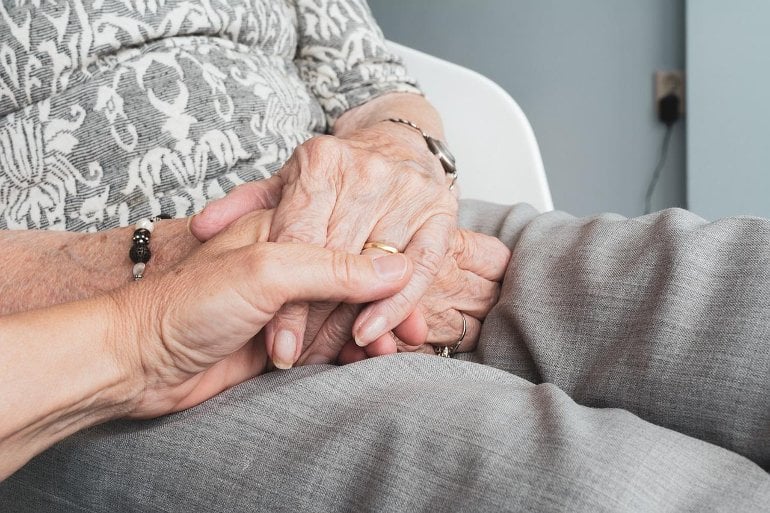Summary: Dementia patients with a history of cancer demonstrate better cognition at dementia diagnosis than their peers with no history of cancer.
Source: University of Alabama at Birmingham
With increased age comes the increased risk to develop cancer or dementia. Both conditions share similar risk factors such as hypertension and diabetes. Many cancer patients experience cognitive impairment from cancer and its treatments with symptoms similar to dementia.
But are these only similarities, or does a cancer diagnosis predispose patients to developing dementia? Prior literature indicates a lower risk of dementia after a cancer diagnosis and vice versa. However, studies of the long-term effects are lacking.
As part of her dissertation at the University of Alabama at Birmingham School of Public Health, Mackenzie Fowler, Ph.D., conducted a retrospective study to evaluate the long-term relationship between the two conditions.
Results published in the Journal of Alzheimer’s Disease showed dementia patients with cancer history demonstrated better cognition at dementia diagnosis and declined slower than dementia patients without cancer history.
“Our findings indicate that, even in the long run, only around 20% of cancer patients develop dementia after their cancer diagnosis, and those who do seem to experience better cognition at diagnosis and over time than those without a prior cancer diagnosis,” said Fowler, now a postdoctoral scholar trainee in the UAB Division of Hematology and Oncology in the Marnix E. Heersink School of Medicine.
“This inverse relationship between cancer and dementia confirms similar results in the medical literature while also providing long-term evidence.”
Overall, patients with one cancer diagnosis had an approximately 1.1-point higher cognitive baseline score and cognitive decline and seemed to progress slightly slower than non-cancer patients. However, patients who had two or more cancer diagnoses saw an approximately 1.5-point lower cognitive score than those without a prior cancer diagnosis.
Fowler used data going back to 2003 from UAB to identify dementia patients with and without prior cancer diagnoses. She then evaluated recorded cognitive scores of the patients over five years from 2014–2020.

Having a clinical patient population also allowed for observation of diversity within the population over an extended period. Rates of cognitive decline between race and ethnicity groups differed. Regardless of cancer status, underrepresented race and ethnicity groups did not perform as well as non-Hispanic white patients.
“The next step is to ask why there is this overall inverse relationship and why two or more cancers seems to alter this relationship,” Fowler said.
“Could it be because early signs of cognitive decline were captured earlier due to a cancer patient’s receiving frequent medical attention? Is it something that is more biologically driven? What about race, socioeconomic status or other social determinants of health? There are many questions to be answered by future studies.”
Fowler notes major study limitations include not being able to differentiate by cancer or dementia type and stages and that all study participants were from one hospital. She hopes to add these variables into future studies with larger, more geographically diverse samples.
About this cancer and dementia research news
Author: Press Office
Source: University of Alabama at Birmingham
Contact: Press Office – University of Alabama at Birmingham
Image: The image is in the public domain
Original Research: Closed access.
“The Relationship Between Prior Cancer Diagnosis and All-Cause Dementia Progression Among US Adults” by E. Fowler et al. Journal of Alzheimer’s Disease
Abstract
The Relationship Between Prior Cancer Diagnosis and All-Cause Dementia Progression Among US Adults
Background: Cancer-related cognitive impairment (CRCI), a frequent effect of cancer and its treatments, shares common cognitive symptoms with dementia syndromes. Cross-sectional studies demonstrate an inverse relationship between cancer and dementia. However, the longitudinal relationship between dementia decline and cancer has not been investigated.
Objective: To evaluate the association between cancer and longitudinal progression of dementia.
Methods: We extracted electronic health record data from July 2003 to February 2020 from a single academic medical center. We identified dementia and cancer history prior to dementia using ICD-9/10 codes. We measured cognitive decline with the Alabama Brief Cognitive Screener (ABCs). We used adjusted linear mixed models to estimate baseline cognition and rate of progression by cancer history, including differences by race.
Results: The study included 3,809 participants with dementia, of which 672 (17.6%) had cancer history. Those with cancer history had higher baseline cognition (β: 1.07, 95% CI: 0.45, 1.69), but similar rate of decline. Non-Hispanic Blacks had lower cognitive scores at baseline and throughout follow-up regardless of cancer status compared to non-Hispanic Whites and other races/ethnicities with and without cancer history.
Conclusion: In this longitudinal retrospective study, participants with cancer history demonstrate better cognition at dementia diagnosis and no difference in cognitive decline than those without cancer history. Smoking and comorbidities attenuate this association and results indicate non-Hispanic Blacks have worse cognitive outcomes in dementia regardless of cancer history than other race/ethnicity groups. Further exploration of the role of smoking, comorbidities, and race/ethnicity on cancer and dementia-related cognitive decline is needed.






